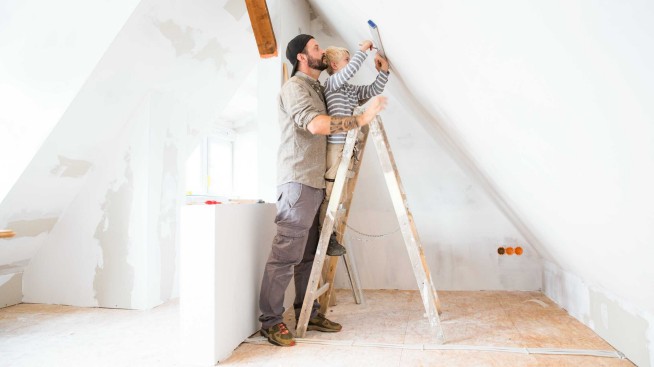Plumbing problems: A homeowner’s guide

Plumbing problems and emergency home repairs might not be the most glamorous aspect of owning a home, but they’re something most homeowners deal with eventually. Running water, working toilets and other types of plumbing are crucial to an efficient and comfortable home. A plumbing issue might leave you with a sinking feeling, but it doesn’t have to be the end of the world if related issues arise. In fact, familiarizing yourself with common plumbing issues and how to prevent or remedy them may come in handy on your homeownership journey.
Common plumbing problems
Plumbing may be a bit of a broad term, but it’s really just referring to any system that moves fluid for a variety of purposes. Because so many household functions require water or other fluids, there are many reasons a homeowner might be troubleshooting plumbing problems. Let’s take a look at some of the more common problems that may require some maintenance.
- Clogged toilets: Dealing with a clogged toilet is rarely fun, but it’s a part of life that many homeowners will likely encounter at some stage. While the trusty plunger may be generally successful at remedying this plumbing problem, heavier clogs may require an experienced technician.
- Clogged drains: Most people are familiar with pulling hair or food out of a clogged drain, but there are many other drain-stopping culprits out there such as soap scum, grease, dead skin and dirt. While you may be able to unclog some of these with a plunger, chemical drain cleaner or a drain snake, severe clogs may require help from a professional plumber.
- Running toilets: When a toilet is “running” it’s not actually going anywhere — it means that water is continuing to flow into the tank past the point of being filled, with the excess draining out into your toilet from the overflow pipe in your tank. This can waste a lot of water. The cause of a running toilet is generally due to a faulty valve or float mechanism, the latter of which helps set a fill limit for the tank. While jiggling the flush handle may help in some cases, a plumber will likely be able to pinpoint and fix the issue at hand.
- Leaky faucets: Drip. Drop. Drip. Drop. A leaky faucet is generally accepted as annoying, but it can also waste water and could lead to higher water bills. Because leaky faucets are generally caused by worn-out washers and seals, they could potentially be fixed by handy homeowners or residents. If you’re not super confident where DIY is concerned, however, it’s best to play it safe and call your local plumber or handyman.
- Low water pressure: While low water pressure isn’t the most devastating plumbing problem, it sure can be a pain when you’re trying to enjoy a shower. Low water pressure may be caused by leaks, mineral deposits in pipes or even an issue with the local water supply. If you’re experiencing low water pressure, check the faucets to see if it’s a localized issue or an issue that’s happening all over the house. Cleaning faucet aerators and showerheads may help the issue, but if it doesn’t, it may be time to call a pro.
- Sump pump failure: Sump pumps are an important defense when it comes to basement flooding, and if they malfunction it could lead to major damage. If you’ve checked to make sure the pump is plugged in and the switch is clear, and testing the pump doesn’t provide any insight, get in touch with a plumber.
- Garbage disposal issues: If your garbage disposal seems to be malfunctioning, it’s likely from improper use, a jam or an issue with the motor. If a quick reset doesn’t solve your problem, it’s best to leave this fix to the professionals.
- Water heater issues: Leaks and insufficient hot water are the most common issues with water heaters. In both cases the culprit is often a buildup of sediment. If flushing the tank doesn’t remove the sediment, or if the conditions persist, you may want to contact a repair person to inspect the heater.
- Sewer blockages: A sewer blockage is generally a stinky situation, so it’s definitely a problem people like to remedy quickly. A professional plumber should be able to resolve the situation with specialized tools like sewer snakes.
- Frozen pipes: When pipes freeze, they’re at risk of bursting, which may cause damage to your home and possibly the people living in it. Keeping your pipes insulated is one way to prevent this from happening, as is maintaining a minimum temperature throughout your home in colder months. If you need to deal with pipes that are already frozen, you may want to try thawing them with a space heater, a heat lamp or other heat-producing mechanisms.
- Water hammer: Despite the name, there’s no actual hammer involved in a “water hammer” situation. The term refers to a sudden stop of water that causes a banging sound in your pipes. While the noise is disruptive enough on its own, water hammers have the potential to damage your plumbing over time. A plumber may be able to install water hammer arrestors or air chambers as a preventative measure.
Covering major plumbing issues
Whether you’ve come home to a surprise pipe burst or you’re finally tacking that plumbing work you’ve been avoiding, paying for major plumbing issues might be unexpectedly expensive. Fortunately, taking care of your home and comfort doesn’t have to break the bank. There are several types of financing homeowners can use to pay for plumbing issues. Let’s take a look at some of the options.
- Homeowners insurance: Some homeowners insurance companies offer coverage for unexpected and accidental plumbing issues. Contact your provider to see if your situation qualifies, as insurance could help make a dent in the cost of repairs.
- Service financing: Some plumbing companies or providers provide their own financing. Talk to your local plumbing businesses to see if they offer this type of payment arrangement.
- Emergency fund or personal savings: Sometimes homeowners will need to tap into savings to pay for their plumbing problems. This money could come from an emergency fund or personal savings. While it may be sad to see those tucked-away bills flying away, using your own funds should help you avoid paying some of the costs associated with loans and other types of financing.
- Personal loans: Personal loans don’t require the collateral of a home equity line of credit and may help homeowners secure funds quickly if the repairs are urgent.
- Government assistance: Some grants and government assistance programs may be useful for homeowners seeking assistance with plumbing repairs. Contact local officials or check online to see if these options are available to you.
- Credit cards: While credit cards may come with high interest rates, they could allow you to cover hefty plumbing costs in a pinch. If you do end up going this route, it’s best to try to pay the charge off quickly to avoid having to pay high interest charges.
In summary
Despite being a fairly normal occurrence for most homeowners, plumbing problems have the potential to be both frustrating and expensive. But that doesn’t mean fixing up your home has to be a stressful experience. Thanks to plumbing professionals and financing options, homeowners may be able to mitigate these issues and keep their homes functional, safe and comfortable.



